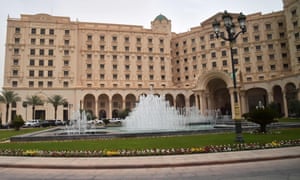Saudi offer in corruption crackdown: 'cough up the cash and go home'
Government demanding up to 70% of rich detainees’ wealth in return for their freedom, newspaper reports
Ian CobainThursday 16 November 2017 13.49 EST
The Ritz-Carlton hotel in Riyadh, where many of those arrested are being held. Photograph: Giuseppe Cacace/AFP/Getty Images
Authorities in
Saudi Arabia are offering businessmen and members of the royal family detained on allegations of corruption an opportunity to pay for their freedom, according to media reports.
Around 200 princes, ministers, senior military officers and wealthy businessmen
have been held in five-star hotels across the country since last week, many of them at the opulent Ritz-Carlton in Riyadh.
Quoting “people briefed on the discussions”, the Financial Times reported that the Saudi government was demanding up to 70% of the individuals’ wealth in return for their freedom.
If settlements are agreed, hundreds of billions of dollars would be diverted into the country’s depleted coffers. Saudi Arabia recorded a budget deficit of $79bn last year and low oil prices have pushed the country into a recession.
The arrests were ordered by King Salman via his son and heir,
Crown Prince Mohammed bin Salman. Their crackdown appears to be popular with Saudis who believe their country is plagued by corruption among members of the royal family and well-connected businessmen.
The attorney general has said he is investigating allegations involving sums of at least $100bn. An estimated 1,700 bank accounts have been frozen.
Those detained include Prince Alwaleed bin Talal, a billionaire who owns stakes in Citigroup and Twitter, who is a nephew of King Salman and who had publicly backed attempts to reform the country.
Others include Waleed al-Ibrahim, the founder of Middle East Broadcasting Centre, which owns the Saudi satellite television channel Al Arabiya, and Bakr bin Laden, chair of the Saudi Binladin construction group.
The businessmen in custody are being asked to hand over assets. Settlements for royals are likely to also include pledges of loyalty to Prince Mohammed, the adviser said.
The FT said many of those detained were keen to secure their release by signing over cash and corporate assets. It quoted one person involved in the negotiations as saying: “They are making settlements with most of those in the Ritz. Cough up the cash and you will go home.”
Royal family members have long received undisclosed monthly stipends from state coffers built up during years of higher oil prices. The government has been forced to introduce austerity measures since oil prices fell three years ago, reducing subsidies and driving up costs for average Saudi nationals.
Critics have said the crackdown amounts to a power grab by Salman, as it has been highly selective: many royals and businessmen have not been detained.
Those detained have been spared prison in an attempt to maintain the delicate consensual alliance between the many different – and often competing – branches of the royal family.
“He couldn’t have put them in the jail,” a senior official explained. “So this was the most dignified solution he could find.”
Other
reforms being introduced include steps to limit the remit of the religious police, who have been stripped of their power of arrest and told they are being absorbed into the interior ministry, and the lifting of the ban on women driving.
The crown prince
told the Guardian last month that he wished to “return Saudi Arabia to moderate Islam”, breaking the alliance between Wahhabi clerics and the country’s ruling elite.
He aimed to end the kingdom’s near total dependence on oil by sweeping away the resistance to change that inhibited the development of a more diverse and open economy.
Seventy per cent of Saudi Arabia’s population are under the age of 30. Over the next decade at least 5 million Saudis are likely to enter the workforce, posing an enormous problem for a government that does not currently have jobs to offer them.
The government is planning a new economic zone to be established on 300 miles of the Red Sea coast, in a tourist area that has already been earmarked as a liberal hub akin to Dubai, where male and female bathers are free to mingle.




